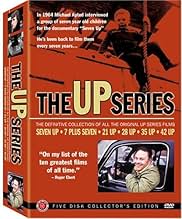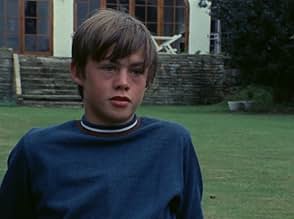7 Plus Seven
- TV Movie
- 1970
- 52m
IMDb RATING
7.9/10
3.4K
YOUR RATING
Director Michael Apted revisits the same group of British-born children after a seven-year wait. The subjects are interviewed as to the changes that have occurred in their lives during the l... Read allDirector Michael Apted revisits the same group of British-born children after a seven-year wait. The subjects are interviewed as to the changes that have occurred in their lives during the last seven years.Director Michael Apted revisits the same group of British-born children after a seven-year wait. The subjects are interviewed as to the changes that have occurred in their lives during the last seven years.
- Awards
- 1 nomination total
Bruce Balden
- Self
- (as Bruce)
Jacqueline Bassett
- Self
- (as Jackie)
Symon Basterfield
- Self
- (as Symon)
Andrew Brackfield
- Self
- (as Andrew)
John Brisby
- Self
- (as John)
Peter Davies
- Self
- (as Peter)
Suzanne Dewey
- Self
- (as Suzy)
Charles Furneaux
- Self
- (as Charles)
Nicholas Hitchon
- Self
- (as Nicholas)
Neil Hughes
- Self
- (as Neil)
Lynn Johnson
- Self
- (as Lindsay)
Paul Kligerman
- Self
- (as Paul)
Susan Sullivan
- Self
- (as Susan)
Tony Walker
- Self
- (as Tony)
Michael Apted
- Self - Narrator
- (uncredited)
Michelle Murphy
- Self (age 7, with Tony)
- (uncredited)
Featured reviews
The 'Up Series' represents one of the most fascinating and unusual uses of film in cinema history - a documentary life-long chronicle of the lives of 14 people starting at 7 years old, revisiting them every seven years through age 49 (so far).
While I could quibble, wishing for a bit more depth here and there (especially with the women, where there's a bit too much emphasis on love and marriage at the expense of all else), it's really an astounding, moving, frightening and uplifting document. There's no way to watch this remarkable series of films without reflecting deeply on one's own life, and how you have changed (and stayed the same) over your own lifetime.
While Michael Aped deserves every bit of credit he's received for this amazing piece of cultural anthropology, it's important to note the first film, 7 Up,was actually directed by Paul Almond, and Apted was a that point a researcher for the project.
While I could quibble, wishing for a bit more depth here and there (especially with the women, where there's a bit too much emphasis on love and marriage at the expense of all else), it's really an astounding, moving, frightening and uplifting document. There's no way to watch this remarkable series of films without reflecting deeply on one's own life, and how you have changed (and stayed the same) over your own lifetime.
While Michael Aped deserves every bit of credit he's received for this amazing piece of cultural anthropology, it's important to note the first film, 7 Up,was actually directed by Paul Almond, and Apted was a that point a researcher for the project.
Director Michael Apted was a simple research assistant in the first one. He would be the driving force for the series from now on. The kids are now 14 year olds, and some of them are fully in their awkward teen stage.
When you see Nicholas and Suzy, they are painfully awkward. It's actually hard to watch. It's like torturing little puppies. When Suzy's dog kills the rabbit, it was actually a welcome break from the intrusion. The class separation is still there as the 3 prep boys move on to their upper crust education. And Tony is fully into his jockeying goal. The boys and girls are moving on with their lives.
The production value is better than the first. We are now moving into a TV movie documentary whereas the first one is a black and white TV show. I do wish for better sound quality. Sure we're getting the teenage mumbling, but maybe subtitles would be helpful.
When you see Nicholas and Suzy, they are painfully awkward. It's actually hard to watch. It's like torturing little puppies. When Suzy's dog kills the rabbit, it was actually a welcome break from the intrusion. The class separation is still there as the 3 prep boys move on to their upper crust education. And Tony is fully into his jockeying goal. The boys and girls are moving on with their lives.
The production value is better than the first. We are now moving into a TV movie documentary whereas the first one is a black and white TV show. I do wish for better sound quality. Sure we're getting the teenage mumbling, but maybe subtitles would be helpful.
The way I think of films is that every film is first about other films and incidentally about life. In referencing or extending our film experience and at the same time providing tools for folding that experience into life movies give us tools FOR life. Or for dreaming, which is much the same.
Here we have the second chapter of a movie made so far over fifty years. It deliberately references the story a well developed one of British class society which exists as much in art as in life, perhaps more. That's because the notion of class is enfranchised by the resources and fealty of those not privileged, and they buy into it because it gives them a story worth being a part of. This is a story about that story.
So just in its notion, this series will be important. I am only at the second chapter at this writing and boy am I hooked. It seems that they couldn't have picked more exemplary types if they had tried. The painfully shy farm boy. The three young upper class schoolboys, trying on old costumes. The three low class girls headed toward shopclerking and daft motherhood. The aspiring jockey. The rich, empty girl on her Scottish estate, sitting on the grass while her dog mauls a rabbit. Its all too perfect. And though the seven year stretch between chapters seems a bit long at this point in their lives, 14 is a great age to see the clumsiness with which these kids adopt their roles.
I understand that some of the 14 souls chose to not continue being gawked at in future episodes. I am sure I would opt out, because each of us are so mundanely transparent when viewed this way.
What an experience. The first chapter was dull. This already is engrossing.
Ted's Evaluation -- 3 of 3: Worth watching.
Here we have the second chapter of a movie made so far over fifty years. It deliberately references the story a well developed one of British class society which exists as much in art as in life, perhaps more. That's because the notion of class is enfranchised by the resources and fealty of those not privileged, and they buy into it because it gives them a story worth being a part of. This is a story about that story.
So just in its notion, this series will be important. I am only at the second chapter at this writing and boy am I hooked. It seems that they couldn't have picked more exemplary types if they had tried. The painfully shy farm boy. The three young upper class schoolboys, trying on old costumes. The three low class girls headed toward shopclerking and daft motherhood. The aspiring jockey. The rich, empty girl on her Scottish estate, sitting on the grass while her dog mauls a rabbit. Its all too perfect. And though the seven year stretch between chapters seems a bit long at this point in their lives, 14 is a great age to see the clumsiness with which these kids adopt their roles.
I understand that some of the 14 souls chose to not continue being gawked at in future episodes. I am sure I would opt out, because each of us are so mundanely transparent when viewed this way.
What an experience. The first chapter was dull. This already is engrossing.
Ted's Evaluation -- 3 of 3: Worth watching.
It's funny to see other reviewers talking about the awkwardness of the subjects and the dullness of their lives. I suppose that might be true if you're watching this installment as a stand-alone film, but I just can't see many people doing that, knowing just how long the series actually took and how many other features are out there. This was where Apted took over the project and made it his own, and this is where we first get to see changes in kids. Suzy goes from being precocious to sullen and bratty, Paul evolves from a wise little buddha to a simply meek kind of fellow, and.we get the first glimpse of Neil's change from a sunny, laughing lad into the tortured soul he'll eventually become.
Preliminary confession-- i've only seen the first two installments, seven up and 7 plus seven. But I'm expecting the ensuing chapters to be far more interesting than 7 plus seven, which was plagued by the unavoidable fact that the subjects were all in the most wretched throes of self-conscious adolescence. made the film very difficult to watch. i might also blame the filmmaker-- perhaps he was so used to the open, honest confessions that he was able to pry from seven year olds that he just didn't do the necessary legwork in making sure that his 14 year old subjects were comfortable enough to interview. maybe he didn't anticipate the resentment the subjects felt towards HIM for making them sit there and interview. while 14 year olds CAN be self-conscious, they can also be motor mouths if they are put in the proper environment. i'm hoping to like the next installments much more.
Did you know
- TriviaMichael Apted was an assistant director and researcher on Seven Up! (1964). Here, he steps in to the director's chair, vacated by Paul Almond. Apted would go on to direct all the rest of the films, and indeed would be the name associated with the series.
- Quotes
Himself - Narrator: Are you happier now than you were then?
- ConnectionsEdited into 42 Up (1998)
Details
Contribute to this page
Suggest an edit or add missing content




































